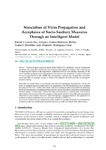Simulation of Virus Propagation and Acceptance of Socio-Sanitary Measures Through an Intelligent Model

Use este enlace para citar
http://hdl.handle.net/2183/34134
A non ser que se indique outra cousa, a licenza do ítem descríbese como Attribution 4.0 International (CC BY 4.0)
Metadatos
Mostrar o rexistro completo do ítemTítulo
Simulation of Virus Propagation and Acceptance of Socio-Sanitary Measures Through an Intelligent ModelAutor(es)
Data
2023Resumo
[Abstract] During the most critical moments of the SARS-COV-2 pandemic, various containment
measures were enacted to hinder the virus’s spread and mitigate its impact. This work focuses
on studying the impact of the population’s adherence level to socio-sanitary measures on the
virus’s spread, aiming to better understand its relevance in crisis situations. To achieve this goal,
we use an agent-based model (ABM) that incorporates a special type of agent that represents
social networks, for example, twitter, to analyze the influence of social networks on the agents’
decision-making.
Internally, our model relies on two models that allow for simulation development. On the one
hand, an epidemiological model based on an adaptation of the SIR model allows us to simulate
the spread of the virus. On the other hand, a decision-making model is responsible for analyzing
the levels of acceptance of containment measures by citizens and allows simulation of interactions
between agents. On this basis, Twitter has been incorporated as a critical node, which allows
information to be extracted about the opinions of the agents and howthese affect the population’s
adherence to socio-sanitary measures. This information is obtained thanks to the application of
sentiment analysis techniques on a set of tweets related to COVID-19.
As a result, a useful tool was obtained for policy makers to simulate the psycho-social behaviour
of citizens in the face of different restrictive measures in order to evaluate their effectiveness
Palabras chave
Influencia de las redes sociales
Modelo SIR
Twitter
COVID-19
SARS-CoV-2
SIR model
Modelo SIR
COVID-19
SARS-CoV-2
SIR model
Descrición
Cursos e Congresos , C-155
Versión do editor
Dereitos
Attribution 4.0 International (CC BY 4.0)






